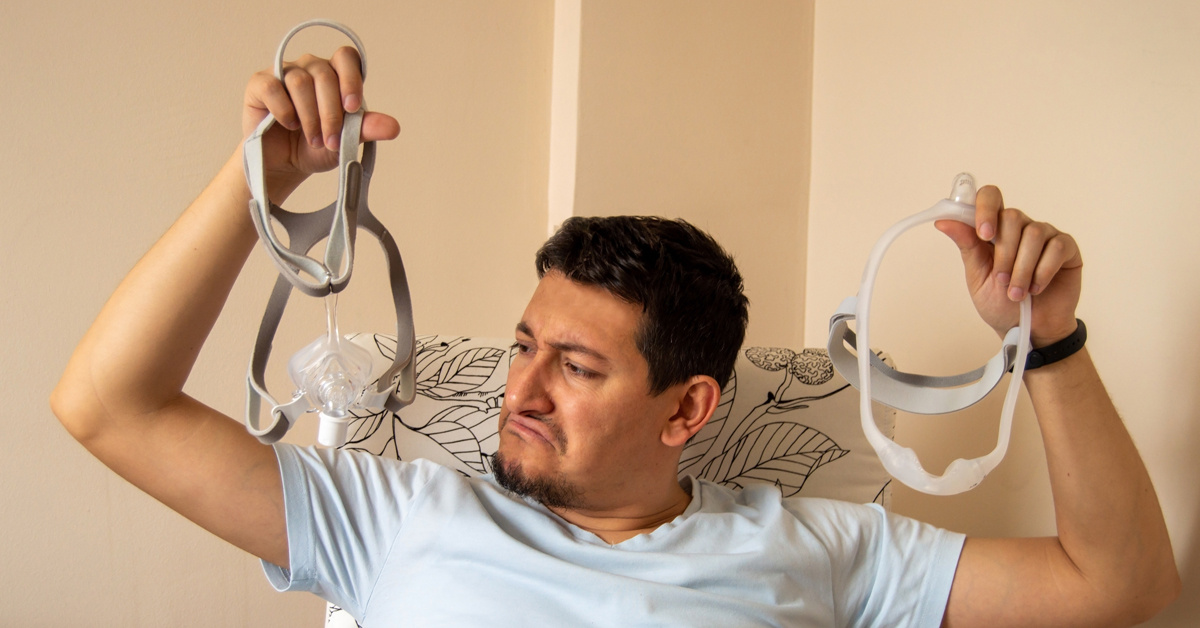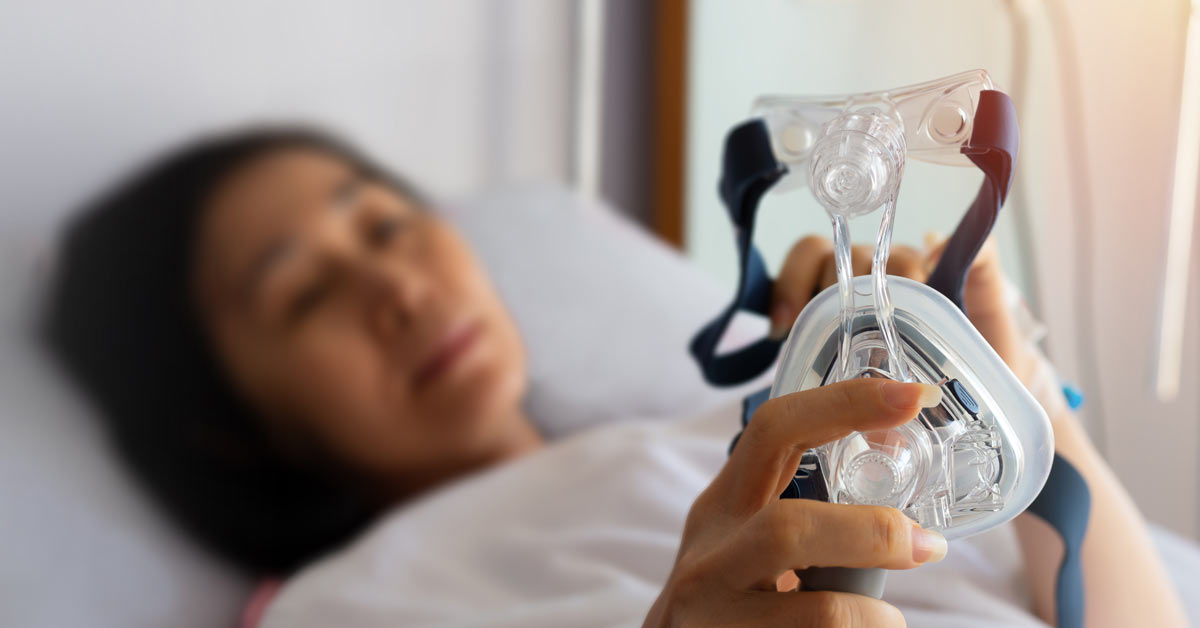Also Called "CPAP Belly," This Annoying Intestinal Problem May Derail Your CPAP Therapy
For more than 40 years, CPAP (continuous positive airway pressure) machines have been the most popular, proven treatment for sleep apnea. They’ve helped people dramatically improve the quality and quantity of their sleep. And CPAP machines have reduced the risk of serious health conditions, such as diabetes, depression, heart attack, and stroke.
However, as effective as CPAP may be, it may produce a side effect called aerophagia (also known as “CPAP belly”), which results in the buildup of bothersome intestinal gas.
Research reveals that 16 percent of CPAP users develop aerophagia, sometimes causing them to discontinue this very important sleep apnea treatment.
The good news: aerophagia can be prevented. Says Robert Miller, Apria Healthcare Vice President of Sleep Business, “The first step to lowering your chance of developing aerophagia—and continuing with your CPAP therapy—is to understand what it is, what causes it, and what you can do to manage it.”
What Is Aerophagia?
Aerophagia happens when you swallow air into your stomach rather than breathing it into your lungs. (Aerophagia means “air eating” in Greek.)
Swallowing air is normal—we all do it every day, especially when we eat or drink. And generally, it’s not harmful. The air is usually removed from the stomach by belching, which prevents excessive amounts of air from entering your digestive tract.
But when excess gas accumulates in your intestines, it may lead to various uncomfortable gastrointestinal symptoms.
What Are the Symptoms of Aerophagia?
Some of the most common symptoms include:
- Bloating
- Belching
- Flatulence
- Loss of appetite
- Abdominal pain
- Stomach rumbling
- Distended belly
- Hiccupping
Less common symptoms include:
- Constipation
- Diarrhea
- Nausea
Over time, symptoms often come and go. It’s also not uncommon for people with aerophagia to have another gastrointestinal disorder, such as GERD (gastroesophageal reflux disorder) or irritable bowel syndrome (IBS).
What Are the Causes of Aerophagia?
Many everyday activities can cause aerophagia, such as:
- Drinking or eating too quickly
- Swallowing saliva
- Drinking carbonated beverages
- Stress and anxiety
- Gum chewing
- Certain medications
- Lying on your back
- Smoking
One more cause of aerophagia is use of a CPAP machine.
How Does a CPAP Machine Cause Aerophagia?
CPAP involves wearing a mask that fits comfortably over your nose or mouth as you sleep. The mask is connected to a machine by your bed that provides a constant, quiet flow of pressurized air to keep your breathing passages open. This helps ensure normal breathing and better sleep.
Sometimes, however, people using CPAP machines may swallow more air than usual because their esophagus—the tube that carries food to the stomach—remains open during sleep, allowing air to enter their digestive tract. The result: CPAP belly.
When aerophagia becomes too uncomfortable, people give up their CPAP therapy. That’s why it’s critically important to understand how to prevent aerophagia.
How Can Aerophagia Be Prevented When Using a CPAP Machine?
Change your CPAP mask. If you use a full-face mask, which covers your mouth and nose, try a nasal mask. Research suggests this type of mask reduces the risk of swallowing air. If you continue to use a full-face mask, be sure that it seals properly on your face.
Adjust CPAP pressure levels. Work with your doctor to reduce the air pressure being pumped by your CPAP machine—without compromising the effectiveness of your treatment.
Try a different type of PAP machine. In addition to CPAP, which delivers a constant flow of air at one pressure setting as you inhale and exhale, there are also two other types of PAP machines:
- BiPAP (bilevel positive airway pressure) delivers pressurized air at two alternating levels: one level when you inhale, another when you exhale.
- APAP (automatic positive airway pressure) automatically adjusts the amount of airway pressure when it detects breathing problems.
Speak with your doctor about which device may be more appropriate for you.
Change your sleep position. Rather than sleeping on your back, sleep on your side. It reduces the risk of aerophagia and also helps keep airways open.
If you have GERD, get it treated. GERD weakens the ring of muscle between your esophagus and stomach, increasing the chance of air entering your stomach and intestines.
Reduce your anxiety about using CPAP. Anxiety may cause panic attacks and hyperventilation—leading to aerophagia. Speak with your doctor about ways to help you keep calm at night, such as using CBT (cognitive behavioral therapy).
Explore more ways to reduce aerophagia. Speak with your doctor about taking anti-gas medications, avoiding foods that cause gas (for instance, some dairy products or veggies like cabbage and turnips), limiting carbonated drinks, and eating more slowly.
Take the Air Out of Aerophagia
If you continue to experience the symptoms of aerophagia, the first thing you should do is speak with your doctor. Apria’s Robert Miller concludes, “You’ll be one step closer to preventing aerophagia. And on the road to continuing with your CPAP therapy to help improve your sleep and overall health.”
References
1. Ikpeze, T. (Updated 2023, January 24). Aerophagia. SleepApnea.org. https://www.sleepapnea.org/cpap/aerophagia/.
2. Harding SM. CPAP-related aerophagia: awareness first! J Clin Sleep Med. 2013;9(1):19-20.
3. Pacheco, D. (Updated 2022, November 8). Aerophagia. Sleep Foundation. https://www.sleepfoundation.org/cpap/aerophagia.
4. Sellman, T. (Updated 2023, March). What to Do When CPAP Makes You Swallow Air. SleepApnea.Sleep-Disorders.net. https://sleepapnea.sleep-disorders.net/clinical/aerophagia.
5. Peters, B. (Updated 2022, August 11). How Does a CPAP Machine Work to Treat Sleep Apnea? Verywell Health.
https://www.verywellhealth.com/how-does-a-cpap-machine-work-to-treat-sleep-apnea.
LEGAL DISCLAIMER: Material in this newsletter is provided for general health education and informational purposes and to provide references to other resources only; it may not apply to you as an individual. While Apria Healthcare believes that the information provided through this communication is accurate and reliable, Apria Healthcare cannot and does not make any such guarantee. It is not intended to be a replacement for professional medical advice, evaluation, diagnosis, services or treatment (collectively, “medical treatment”). Please see your healthcare provider for medical treatment related to you and your specific health condition(s). Never disregard medical advice or delay seeking medical care because of something you have read on or accessed through this website. Reading this newsletter should not be construed to mean that you have a healthcare provider/patient relationship.





